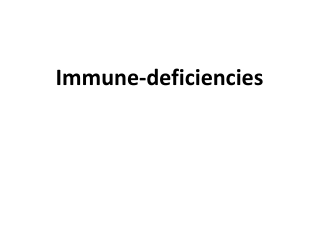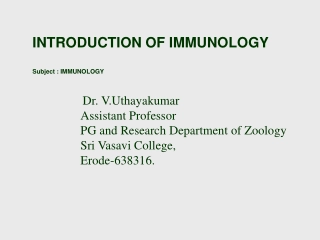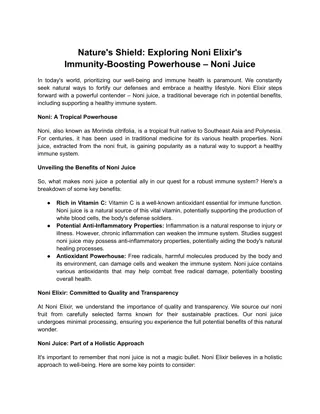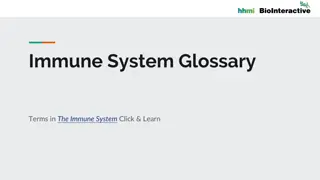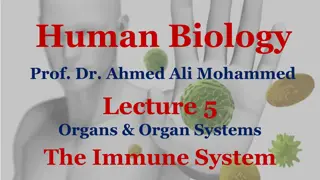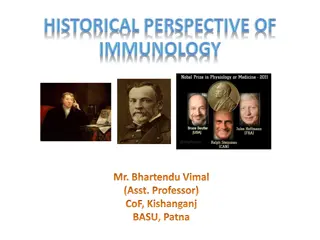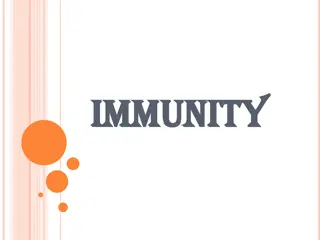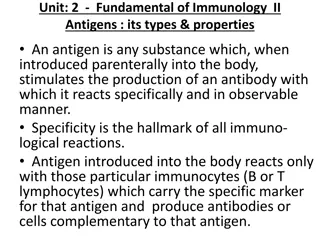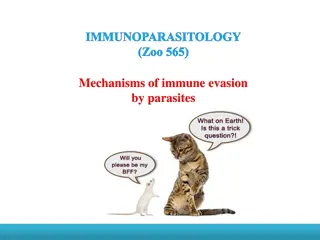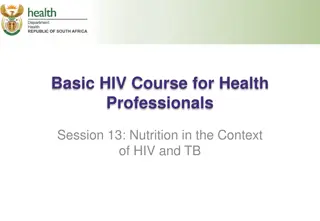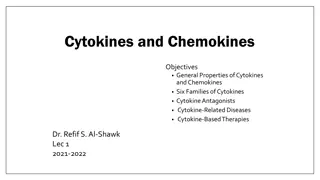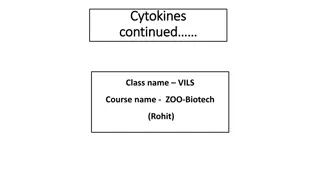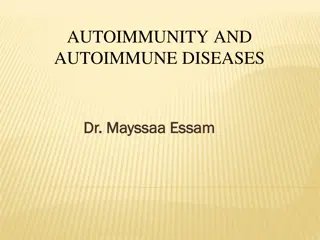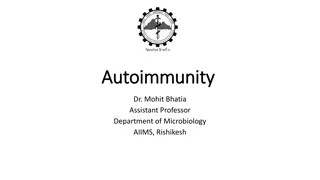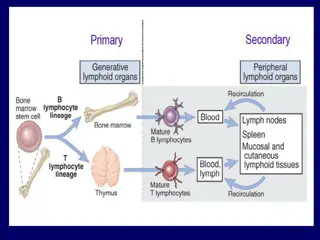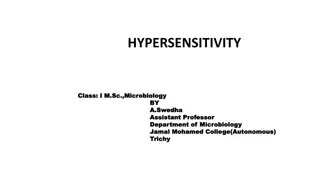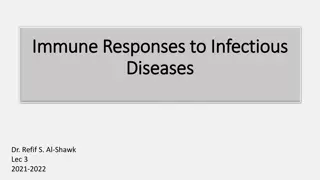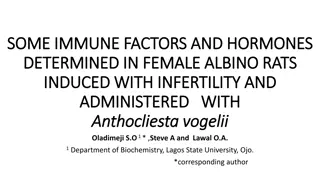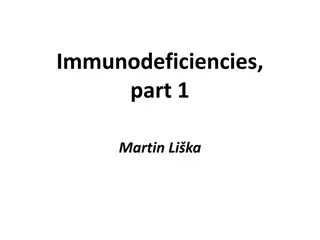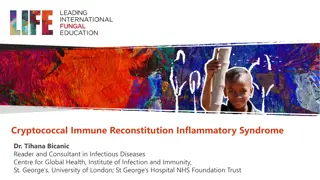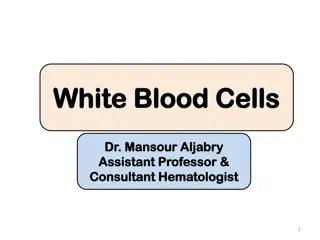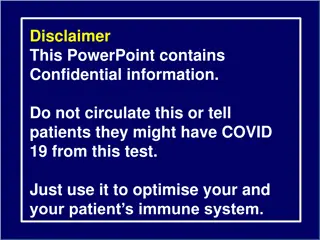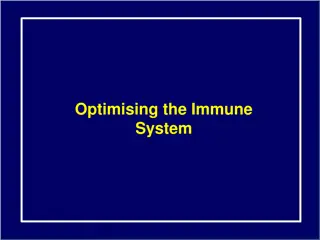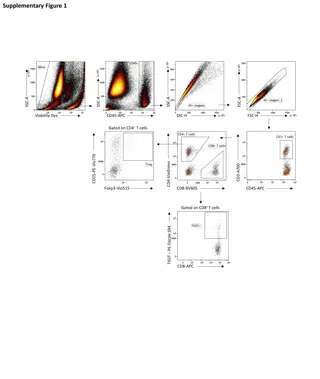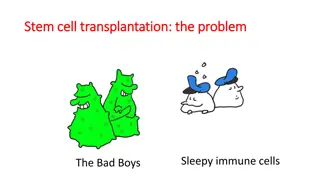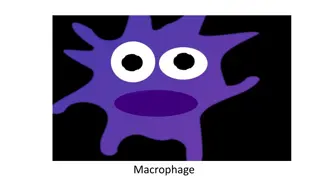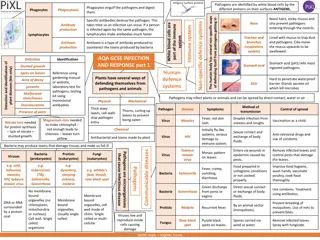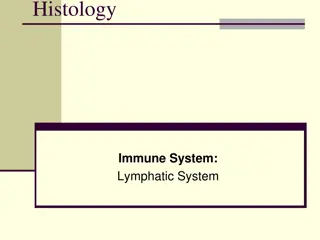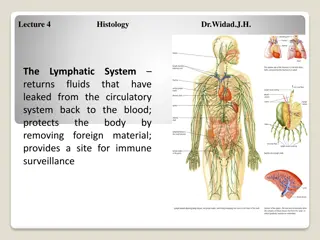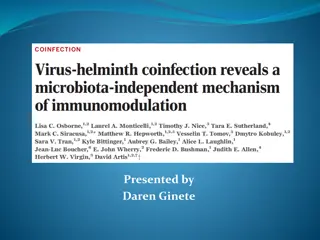Immune-deficiencies
Immune deficiencies can be classified into primary hereditary disorders based on clinical presentations, including cell-mediated, antibody-mediated, non-specific, and complement activation deficiencies. Major clinical manifestations of immune disorders range from B-cell deficiencies to phagocytic ce
2 views • 46 slides
INTRODUCTION OF IMMUNOLOGY
Explore the fundamentals of immunology with insights into immunogens, antigens, epitopes, and haptens. Uncover how these key components play vital roles in shaping immune responses and learn about paratopes, the basis of immunogenicity, and the key events that determine foreignness in the immune sys
0 views • 15 slides
Understanding Immune Thrombocytopenia (ITP) and Its Impact
Immune Thrombocytopenia (ITP) is a rare autoimmune disease where the immune system wrongly attacks platelets, leading to low platelet count. It can affect individuals of all ages, with symptoms appearing post-virus, vaccination, or certain medications. ITP can result in fatigue, bruising, and bleedi
3 views • 30 slides
Nature's Shield_ Exploring Noni Elixir's Immunity-Boosting Powerhouse – Noni Juice
In today's world, prioritizing our well-being and immune health is paramount. We constantly seek natural ways to fortify our defenses and embrace a healthy lifestyle. Noni Elixir steps forward with a powerful contender \u2013 Noni juice, a traditional beverage rich in potential benefits, including s
0 views • 2 slides
Comprehensive Guide to Immune System Glossary Terms
Dive into the world of immune system glossary terms with definitions and visual aids. Explore key concepts such as immune cell activation, adaptive immune response, antibodies, antigens, and more. Understand the complex processes within the immune system through informative images and concise explan
1 views • 70 slides
Understanding the Immune System: Organs, Functions, and Importance
The immune system acts as a defense mechanism against pathogens and infections, comprising various organs, such as the bone marrow, thymus, spleen, white blood cells, antibodies, complement system, and the lymphatic system. It works to recognize and destroy harmful microbes, maintaining the body's h
1 views • 23 slides
Overview of Immunology: From Historical Perspectives to Modern Techniques
Immunology is the study of the immune system, its functions, and responses to various stimuli. The field traces back to ancient times, with historical figures like Thucydides and Edward Jenner contributing to its development. From innate immunity to adaptive responses, the immune system plays a cruc
0 views • 29 slides
Understanding Acquired Immunity and Its Types
Acquired immunity, also known as adaptive immunity, is the resistance developed by an individual to foreign molecules. It involves antigenic specificity, diversity, immunologic memory, and self/non-self recognition. The two main types of acquired immunity are active immunity, developed from antigeni
3 views • 17 slides
Overview of Lymphoid Organs in Finfish and Shellfish
Lymphoid organs play a crucial role in the defense mechanisms of finfish and shellfish by generating immune cells. Different types of fish vary in their lymphoid organ structures, with jawless fish relying on lymphoid tissue within other organs for immune cell production. Cyclostomes, like hagfish a
1 views • 24 slides
Understanding Hypermobile Ehlers-Danlos, Mast Cell Activation, and Autonomic Dysfunction
Hereditary Connective Tissue Disorder, Hypermobile Ehlers-Danlos Syndrome (hEDS), and Mast Cell Activation Syndrome (MCAS) are three complex conditions with overlapping symptoms affecting collagen, joint laxity, and immune responses. Features associated with these conditions include joint pains, gas
2 views • 8 slides
Understanding Antigens and Immunogens: Types and Properties
Antigens are substances that stimulate the production of antibodies in the body, exhibiting specificity in immune reactions. They interact with immune response products like antibodies, BCRs, and TCRs. Immunogens induce detectable immune responses, leading to antibody production or T cell activation
1 views • 30 slides
Mechanisms of Immune Evasion by Parasites in Immunoparasitology
Understanding how parasites evade the immune system of their hosts is crucial in the field of immunoparasitology. Parasites have developed various strategies such as anatomical seclusion, antigenic variation, and intracellular living to avoid host immune responses. Examples include Plasmodium within
0 views • 26 slides
Importance of Nutrition in the Context of HIV and TB
Malnutrition is common in people living with HIV and TB, exacerbating immune suppression and disease progression. Good nutrition can strengthen the immune system, improve drug adherence, and manage symptoms, while poor nutrition weakens immunity and increases vulnerability to infections. Consequence
2 views • 20 slides
Understanding Cytokines and Chemokines: Key Concepts and Implications
Cytokines and chemokines are essential signaling molecules that play crucial roles in immune responses. This content covers their general properties, classification, functions, and implications in diseases and therapies. Learn about the diverse families of cytokines, cytokine antagonists, and the va
0 views • 35 slides
Understanding the Significance of Cytokines in Immune Response
Cytokines play a crucial role in immune response activation and regulation. They are secreted by various cell types like lymphocytes, monocytes, and macrophages, exerting diverse biological functions, including immune system development, inflammatory response induction, and hematopoiesis regulation.
2 views • 12 slides
Understanding Autoimmunity and Autoimmune Disorders
Autoimmunity refers to the immune system's failure to recognize its own cells, leading to attacks on self-tissues. Autoimmune disorders encompass over 80 chronic illnesses where the immune system mistakenly targets organs. These disorders are poorly understood and recognized, impacting various organ
1 views • 20 slides
Understanding Autoimmunity and Immunological Tolerance
Autoimmunity is a condition where the body's immune cells mistakenly attack its own tissues, leading to damage. Immunological tolerance helps prevent this by mechanisms like central and peripheral tolerance. Central tolerance involves deleting self-reactive immune cells during maturation in key orga
1 views • 32 slides
Understanding Host Defense Mechanisms Against Infection
Host defense mechanisms safeguard the body from pathogens through various strategies such as intact skin, mucous membranes, nonspecific immune responses like phagocytic cells, and specific immune responses involving antibodies and lymphocytes. Key protective barriers include the skin, eyes, digestiv
3 views • 16 slides
Immune Response Regulation and Autoimmunity Overview
The immune system maintains a balance through tolerance mechanisms to prevent autoimmunity. Central and peripheral tolerance play crucial roles in immune unresponsiveness to self-antigens. Failure in immune regulation can lead to autoimmune diseases like diabetes and lupus. Vaccination, discovered b
0 views • 18 slides
Understanding Hypersensitivity Reactions in Immunology
Hypersensitivity in immunology refers to an altered immune response against antigens, leading to hyperreactivity and immunopathology. This article delves into the different categories of adaptive hypersensitivities, focusing on Immediate (Type I), Antibody-Mediated Cytotoxic (Type II), and Immune Co
0 views • 6 slides
Immune Responses to Parasitic Infections and Evasive Strategies by Protozoan and Helminth Parasites
Parasitic infections pose complex challenges to the immune system due to the diverse nature of parasites, including protozoans and helminths. Protozoan parasites move between arthropod vectors and mammalian hosts, requiring both humoral and cell-mediated immune responses. Meanwhile, helminths, as mu
0 views • 15 slides
Navigating the Immune Health Supplement Aisle: What to Purchase or Pass?
In this informative presentation, Lauren Green, MS, RD, LDN, explores the world of immune health supplements, discussing regulations, safety considerations, and different types of supplement claims. From understanding the definition of supplements to key factors in making purchasing decisions, this
1 views • 16 slides
Understanding White Blood Cells and the Immune System
Explore the intricate details of white blood cells (WBCs), their types, functions, formation, and crucial role in defending the body against infections. Delve into the immune system, comprising barriers, cells, tissues, and organs that combat invaders, with a focus on innate and adaptive immunity. L
0 views • 65 slides
Immune Factors and Hormones in Female Albino Rats with Induced Infertility
The study examines immune factors and hormones in female albino rats induced with infertility and administered with Anthocleista vogelii extract. The investigation aims to assess the plant's purported traditional medicinal benefits for fertility enhancement in females. Methods include preparation of
0 views • 19 slides
Understanding Anti-Inflammatory Foods and Immune Function
Our health is closely linked to the gut microbiome, with fiber playing a key role in feeding beneficial gut bacteria. Incorporating anti-inflammatory polyphenols from plant-based sources like fruits, vegetables, and herbs can promote a healthier gut. Additionally, fermented foods act as natural prob
1 views • 8 slides
Understanding the Importance of the Immune System for Homeostasis
Explore the intricate workings of the immune system, from its component parts and defense mechanisms to the significance of homeostasis maintenance. Discover how non-specific and specific immune responses, phagocytosis, neutrophils, natural killer cells, and interferons play vital roles in protectin
0 views • 32 slides
Understanding Immunodeficiencies: Classification, Frequency, and Types
Basic immunological terms explain the functions of the immune system, including defense against infection, homeostasis, and immunological surveillance. Immunodeficiencies are disorders of the immune system that impair its ability to carry out these functions. They can be classified into humoral, cel
0 views • 39 slides
Understanding Cryptococcal Immune Reconstitution Inflammatory Syndrome
Cryptococcal Immune Reconstitution Inflammatory Syndrome (C-IRIS) is a condition where rapid reversal of immunodeficiency triggers exaggerated inflammatory reactions in response to Cryptococcus antigens. It can manifest as either Unmasking IRIS or Paradoxical IRIS, with common CNS presentations incl
0 views • 10 slides
Understanding Hematopoiesis and White Blood Cells in Blood Formation Process
The process of hematopoiesis involves the lifelong production, multiplication, and specialization of different blood cells in the bone marrow, starting with the stem cells. This process includes the differentiation and proliferation of various progenitor cells, regulated by hematopoietic growth fact
0 views • 27 slides
Understanding Immunotoxicity in Fish: An Alternative Model for Toxicological Studies
The study explores the immunotoxic effects of industrial effluents on fin fish, highlighting xenobiotics' impact on the immune system. It discusses the sensitivity of the immune system to environmental toxins and the elicitation of immune reactions by various substances. The importance of fish as a
0 views • 25 slides
Optimizing Immune System Through Holistic Approach
This PowerPoint presentation contains confidential information on optimizing the immune system to enhance overall health. It outlines a holistic approach involving neurological organization, meridian testing, and spectroscopic emission to support well-being. The content emphasizes the importance of
0 views • 27 slides
Understanding Apitherapy in Immune-Mediated Disorders
Apitherapy, the medical use of honeybee products, holds a rich history dating back to ancient civilizations like Egypt and Greece. It encompasses various bee-derived substances such as bee venom, honey, royal jelly, propolis, and beeswax, offering a holistic approach to healing immune-mediated disor
0 views • 84 slides
Understanding Immune System Optimization for COVID-19 Detection
Exploring a unique method of detecting potential COVID-19 cases by observing weakened responses to a specific colored acetate sheet emitting 633nm light. This approach, though not diagnostic, offers insights into immunity against the virus and recommends supplements like Liposomal Vitamin D3, Zinc,
0 views • 32 slides
Immune Cell Analysis Supplementary Figures
This collection of supplementary figures provides detailed flow cytometry data on immune cell populations, including CD4+ T cells, CD8+ T cells, tumor-associated macrophages, and more. The figures also include information on immune checkpoint molecules like PD-L1 and TIGIT. Each figure presents spec
0 views • 4 slides
Understanding Stem Cell Transplantation: Removing Sleepy Immune Cells and Fighting "The Bad Boys
Stem cell transplantation involves addressing the issue of immune cells failing to recognize and eliminate tumor cells, known as "The Bad Boys." By removing the dormant immune cells and replacing them with new ones from a compatible donor, the therapy aims to empower the immune system to target and
0 views • 8 slides
Journey of Immune Cells in the Body
Explore the different stages of the immune response, starting with macrophages in the innate immune system that act fast without memory. Follow the path to the spleen and lymph nodes where T cells, already educated at birth to recognize specific antigens, await. Witness the intricate dance of the im
0 views • 18 slides
Understanding Pathogens and Immune Response Mechanisms
Pathogens, such as bacteria, viruses, and fungi, can cause infectious diseases in humans, animals, and plants. The immune system defends against these pathogens through various mechanisms, including the production of antibodies, phagocytosis, and the activation of specific defense cells like white b
0 views • 4 slides
Understanding the Lymphatic System and Immune Response
The lymphatic system, a vital component of the immune system, consists of lymphocytes, plasma cells, and other cells within a framework of reticular cells and fibers. It includes lymphoid organs like the bone marrow, thymus, lymph nodes, and spleen. Diffuse lymphatic tissue and lymphatic nodules are
0 views • 20 slides
Overview of the Lymphatic System and Immune Response
The lymphatic system plays a crucial role in returning leaked fluids back to the blood, protecting the body from foreign materials, and supporting immune surveillance. It consists of lymphoid cells such as T and B lymphocytes, macrophages, dendritic cells, and reticular cells that work together to d
0 views • 31 slides
Understanding Helminths and Immunomodulation: A Comprehensive Study
Helminths, parasitic organisms affecting a large part of the global population, can modify the immune response through immunomodulation. This research delves into the interaction between helminths, microbiome, and immune response, exploring the effects on macrophages, alternative activation, and the
0 views • 28 slides
